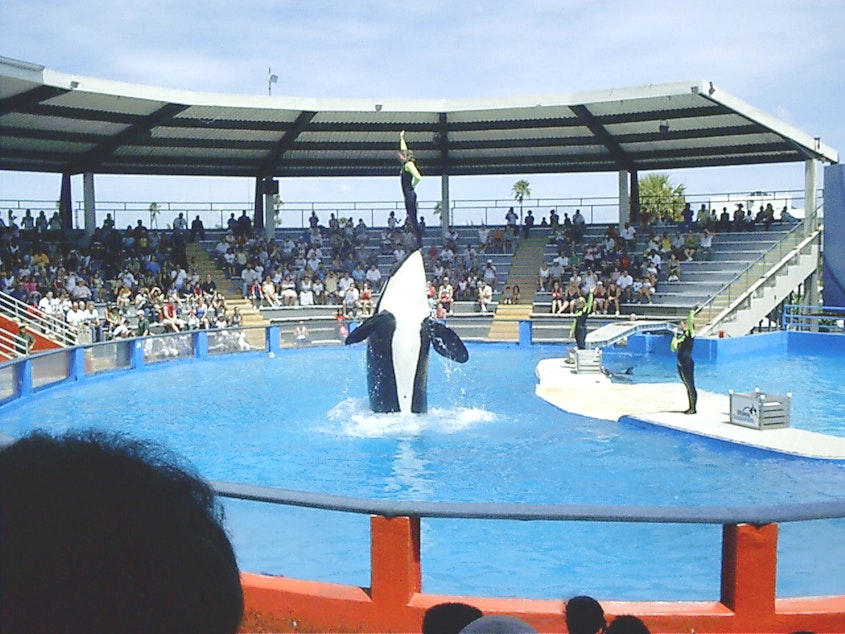'Toki' the orca dies in captivity before planned PNW return

The orca known as Tokitae has passed away at the Miami Seaquarium, months before she was slated to return to her home Northwest waters. She was 57.
According to a statement from the Miami Seaquarium:
"Over the last two days, Toki started exhibiting serious signs of discomfort, which her full Miami Seaquarium and Friends of Toki medical team began treating immediately and aggressively. Despite receiving the best possible medical care, she passed away Friday afternoon from what is believed to be a renal condition. Toki was an inspiration to all who had the fortune to hear her story, and especially to the Lummi nation that considered her family. Those who have had the privilege to spend time with her will forever remember her beautiful spirit."
The news is a sharp turn from an update on the orca one month ago, when a veterinarian reported that Tokitae was stable and in good condition. The Seaquarium also reported three days ago that Tokitae was was doing well.
RELATED: Following Tokitae's sudden death, Northwest tribes call for repatriation of orca's remains
An effort by the Friends of Toki to return the orca to the Salish Sea, where she was born, had recently made progress. Plans were in place to move Tokitae back to the Northwest, and a return trip was estimated to take place later this year.
Sponsored
Tokitae was affectionately called "Toki," and was also known by the stage name of "Lolita" while performing at the Miami Seaquarium. She was taken away from her Southern Resident family, the L Pod, in Puget Sound in 1970, and has lived at the Seaquarium ever since.
"It is sad for us because we have had to live with the reality of what humans have put her through," said Jay Julius with Se'Si'Le, a group that uses Indigenous ancestral knowledge for environmental purposes. "At the same time, we take a look from a non-human perspective, and less selfishly, how much peace she must feel now after a life in prison, a life in captivity, a life in which she was prostituted out for money, for billions and billions of dollars, for entertainment of the human species. What peace she must feel right now."
Julius, a member of the Lummi tribe, was part of the effort to bring Tokitae back to the Northwest. He says he went to Miami in 2018 and spoke with leadership about bringing her home.
"I think her passing opens up the door for truth-telling about us humans, about our policies, and allows us to ask ourselves who we have become."
Howard Garrett, cofounder of the Orca Network, was also part of the region's effort to return Tokitae to Puget Sound. He told KUOW that he began educating people about the orca and her connection to the Northwest in 1995.
Sponsored
"She still had that connection [to Puget Sound] in her mind," Garrett said. "That was demonstrated by the fact her calls that she still made every day, were the same calls that she learned, that only her family used. So she had that connection."
Garrett now hopes that Tokitae's story will be a lesson about the needs of orcas in the Salish Sea, their food supply, and importance to the region. He adds that he hopes Tokitae's remains will be returned to Puget Sound.
Sponsored
"Sk’aliCh’elh-tenaut [Tokitae / Lolita] has walked on," Sacred Sea, an Indigenous-led land conservancy, said in a statement. "This was sudden and unexpected. Our grief is heavy. Right now, we have no words.
“All of us at NOAA Fisheries are deeply saddened by the death of Tokitae, also known as Lolita," said Kim Damon-Randall, director of NOAA Fisheries’ Office of Protected Resources in a statement. "In the language of the Lummi Nation of the Pacific Northwest, she is Sk’aliCh’elh-tenaut. Her death is a loss for the endangered Southern Resident killer whale population and all of us who deeply care about them. We hope her legacy inspires us all to protect the rest of her family and the wild population in the open waters of the Northwest.”
According to the Whale and Dolphin Conservation, 166 orcas were captured and placed in captivity, like Tokitae, since 1961. The average lifespan for a female orca is 46 years; some can live to be 90 years old in the wild.
All other orcas taken from Puget Sound died by 1987, according to Garrett.

